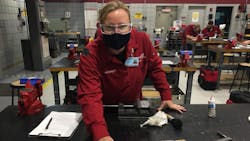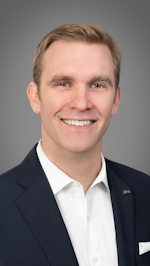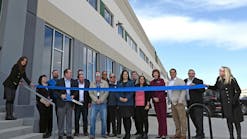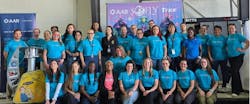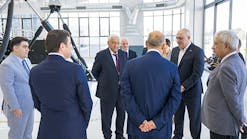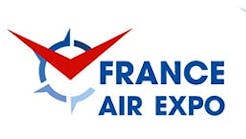What We Can Learn
“As long as you have a willingness to learn and a good work ethic you can do anything.”
Kristi Burns answered quickly when asked what she’d tell someone considering a career in aviation maintenance. Burns is a heavy maintenance structures supervisor for Airborne Maintenance and Engineering Services in Wilmington, Ohio. She joins a list of 39 other young professionals as AMT Magazine’s 2021 “40 Under 40” honorees.
Each year, ARSA uses this space to help the magazine celebrate those recognized as the future of the industry. Doing so helps the association’s team re-energize its own commitment to aviation by finding inspiration in each of the young professionals featured. In that spirit, I contacted Burns — one of the handful of winners working at ARSA member companies — to learn about her experience and see what it can teach us all about the pathways needed to grow our collective future.
She’s young, which is the design of any “under 40” celebration, yet carries long experience. As a 16 year old, Burns joined a teen program at Airborne through which she worked summers at the then-cargo carrier’s sort center. By 18, she was on the ramp loading aircraft, the beginning of a progression that has continued for more than a decade.
“I honestly had no idea,” she explained when asked if she expected that summer job to grow into a continuing career. “I didn’t know I’d be a supervisor of heavy maintenance, that’s for sure.”
She had wanted to be a software engineer; her teenage foot in the door was a benefit of her parents’ employment. Her father was an A&P mechanic and Airborne’s QC director who later worked at the FAA. Her mother was a non-certificated technician in the paint shop before becoming a records clerk. Her sister now also works in the facility — it’s truly a family affair.
The chances at growth carried her away.
After high school, she went into sort maintenance working on facility equipment used for routing and loading packages. From there, she landed a position as a cleaner in Airborne’s component overhaul facility and began building toward her own certification; she earned her powerplant rating based on experience and then used community college training to qualify to test for her airframe rating. From there, she continued to grow, estimating that every five years she moved into a new position or challenge.
“The way this industry is, you can move up…and Airborne gives you plenty of opportunities to move up,” she said.
Discussing how those opportunities are made real for others, Burns described carefully developed training, mentorships, internships and developmental programs through which students can work and learn to transition from a classroom into a hangar or component shop. She cycles interns between her department and others, including her sister’s, to help expose them to every part of the operation.
What Burn’s teaches — the central lesson she’s clearly learned well herself — is that a good work ethic produces opportunity. Developing that ethic is not magic, it’s an exercise in seeing the excitement and challenge in the work itself. She described the most fun aspect of her career to be the creativity demanded in maintenance problem solving: Working through new issues, finding new fixes and making it work within a set system.
“This is a fun job and you learn something new every day,” Burns said. “You could do this job for 50 years and still learn something new every day.”
Burns’ commitment to lifelong learning is familiar. In fact, the same sentiment was expressed by ARSA’s 2021 Scholarship winner, Fawn Carrington of Tulsa Technology Center, just a few days earlier.
Carrington, an Air Force veteran whose hands-on technical experience began as a teenager fixing cars in her driveway, was impressed by the work of aircraft maintenance technicians she observed while serving alongside them on active duty.
“I witnessed them hard at work,” Carrington said. “I became intrigued with the jobs they had and developed a respect for their dedication and unwavering work ethic.”
Since leaving active duty, Carrington has turned her own work ethic to the spirit of aircraft maintenance. “If anyone has a curiosity or passion for aviation…[they] should pursue an aviation maintenance program,” she said, explaining what she would tell someone considering a career in the industry. “It is as fun and useful as it is interesting to learn about the aerodynamics and practices involved in making these flying machines fly. The aircraft we have flying today are truly amazing and the learning never stops.”
What can we learn from examples like these? To listen.
Both Burns and Carrington represent the best of what the aviation community needs. Young women — a group that is far too underrepresented in maintenance facilities — who see fun, creativity and value in the work. From early hands on experiences — on an airport ramp or in a driveway — to professional exposure to skill and personal development, they both demonstrate the value of ongoing commitment.
Congratulations to Burns, Carrington and the countless honorees, scholarship winners, laureates and others honored by the aviation community every year. Their commitment to learning, work ethic and willingness to serve others can teach us all quite a lot.
Brett Levanto is vice president of operations of Obadal, Filler, MacLeod & Klein, P.L.C. managing firm and client communications in conjunction with regulatory and legislative policy initiatives. He provides strategic and logistical support for the Aeronautical Repair Station Association. He was a 2015 AMT Magazine NextGen Award Winner.
